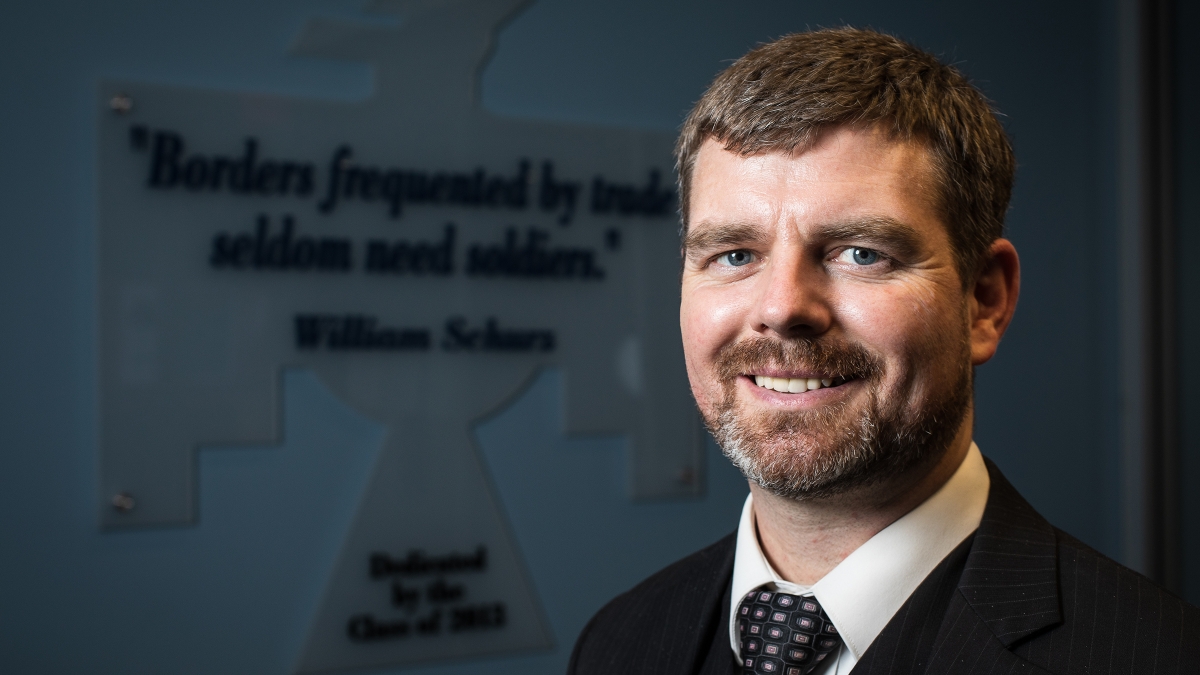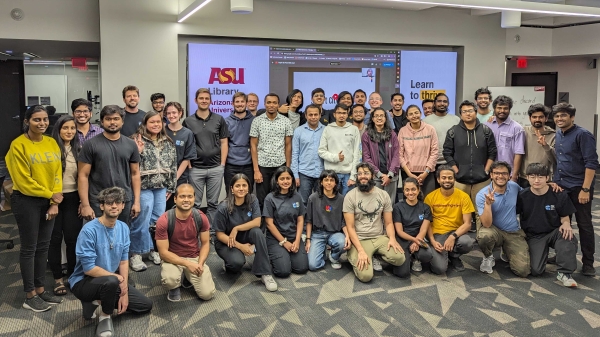Outstanding veteran graduate works across boundaries to help others succeed

Les Mounteer is inspired by Thunderbird's founding mission of building world peace through international commerce and its 21st-century commitment to advancing inclusive and sustainable prosperity worldwide.
Editor's note: This story is part of a series of profiles of notable fall 2020 graduates.
Long before winning the fall 2020 semester’s Barton Kyle Yount Award as the outstanding graduate of Thunderbird School of Global Management at ASU, Les Mounteer learned empathy from a young age.
Relocating more than 22 times before the age of 17, he gained a greater understanding of culture and people with different backgrounds. This human interest grew over time and took Mounteer to even more new places. It manifested in his life as early as first grade when he independently adopted a strong interest in Chinese culture, which he pursued through books and video games, making friends in all corners of the world, many of which he went on to visit.
As a well-traveled child, the future U.S. armed forces veteran was known to turn any bullying he experienced into compassion and an understanding for others. Mounteer carried this global mindset and empathetic perspective with him as he stepped into a global role in the military himself.
When the time came to pursue his master’s degree, Mounteer felt drawn to the mission and history of Thunderbird as an agent of positive change on a global scale. The institution’s commitment to advancing peace and sustainable prosperity across sectors and borders resonated on a deep level with Mounteer. In his defense-sector career, he saw firsthand the struggles exacerbated by cross-cultural miscommunication between nations, especially between the U.S. and both its allies and adversaries abroad.
As a graduate student at Thunderbird, Mounteer saw in his first semester the challenges and disadvantages overcome by many of his fellow students, about 40% of whom are international students. Some of these students did not have the same access and opportunity to gain a love for computers and data analytics as Mounteer did at an early age. So to be helpful as their classmate, he worked with a Thunderbird professor to start the Thunderbird Data and Analytics Club with the purpose of leveling the playing field in this hardware- and software-intensive discipline, no matter the socioeconomic background of the members. Mounteer formed the club as a way to foster leadership and mentoring skills in its members while simultaneously cultivating and refining their data analytics knowledge. The club has provided both student- and faculty-led workshops to help students reach new levels of expertise, and Mounteer says it also helped prepare him to launch his next professional endeavor with a Master of Global Management degree from Thunderbird.
Question: Why did you choose ASU?
Answer: I chose ASU because of Thunderbird School of Global Management. I was interested in earning an MBA, and ASU was on my list. Thunderbird’s Master of Global Management program rose to the top because of the school’s rich history. I have several mentors who have graduated through the Thunderbird program, and its purpose today has changed little from its purpose over 70 years ago. Yes, some of the graduate program has changed to match the times, but ultimately it is still the school established by Lt. Gen. Yount, and as its second president eloquently put it, “Borders frequented by trade seldom need soldiers.”
The founding mission of advancing world peace through international commerce is more important than ever. As a veteran, I feel strongly attached to the history and missions of Thunderbird. Now that it is part of the ASU Knowledge Enterprise, I can only imagine the future that will develop from this joining of forces. It’s definitely one I want to be a part of.
Q: Which professor taught you the most important lesson while at ASU?
A: I struggle with this one because I have been humbled by several professors. I think the most important to me personally though would be Dr. Patrick Lynch. He works so tirelessly on trying to mentor all his students and to increase their abilities in technology management and their understanding of data. I paraphrase, but he mentioned in our first class that the grade isn’t important, the lessons learned are what is important.
Sometimes we get so caught up in the destination that we forget the journey. I really believe that at Thunderbird, the journey is what you are paying for. The degree is just the receipt of an amazing experience that helps you to better understand yourself, those around you, and how to work between the two to create a better world.
Q: What’s the best piece of advice you’d give to those still in school?
A: Two things: You only get out what you put in. And in five years, you’ll be five years older.
School is more than memorizing algorithms and frameworks. As Will in “Good Will Hunting” put it, “You just spent 150 grand on an education you could have gotten for $1.50 in late fees at the public library.” It might even be cheaper using a DuckDuckGo search.
It’s the interactions you have at school with your classmates and professors, the investment of your time in club events and activities, and the ability to use what you’ve learned outside of the class that makes school valuable.
If you attend school to sit in a chair and return home without ever applying your learnings, expecting to get a six-figure salary when you graduate — first, you are going to be disappointed, and second, you’ve wasted a lot of money. More importantly, you’ve wasted a lot of time.
Time ticks the same for all of us. In five years, you’ll have either completed a degree or you will not have, but you’ll still be five years older. My advice to new students is to keep making new goals and keep working towards them even when things are challenging. COVID, for example, is not a reason to stop planning or to stop working. Quite the opposite, in fact. Use the time you have to continue improving yourself and when you can, donate some of that time to helping others. You will never lose anything by helping someone else achieve greatness.
Q: If someone gave you $40 million to solve one problem on our planet, what would you tackle?
A: I have a dirty secret. I have a teacher’s heart. In my mind, one of the biggest challenges facing the world is the lack of access to knowledge. Had I the resources needed, I would love to set up rural education in science, technology, engineering and math around the world. I would offer it freely if only to help those in poverty pick themselves up and build a brighter future.
I believe in the saying that as the tide rises so do all ships. As we increase the knowledge in these areas around the world, I believe we also increase the ability for innovation and prosperity. We are a world overly rich with questions that need answers, but so few people actually work on solving them. From space exploration to deep-sea investigations, from agriculture to medicine, we have so many important questions that could be addressed with more people knowledgeable in these fields.
The diversity of ideas and thoughts from around the world could bring new perspectives to old ideas and potentially power an information renaissance.
Written by Joanna Furst
More Science and technology

SpaceHACK highlights student solutions to environmental challenges, digital divide
By Adrianna Nine About 250 students from around the world convened online and at Arizona State University on March 22 for the…

New AI for a new era of discovery
As the legend goes, in 1665, Sir Isaac Newton sat in his garden at Woolsthorpe Manor in England and looked on as a lone apple…

ASU receives 3 awards for research critical to national security
Three researchers in the Ira A. Fulton Schools of Engineering at Arizona State University have received grant awards under the …